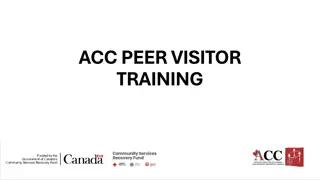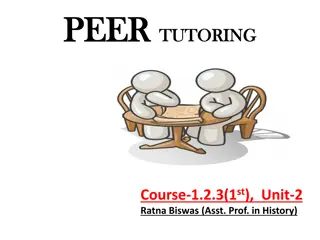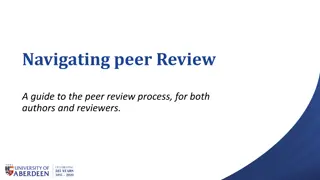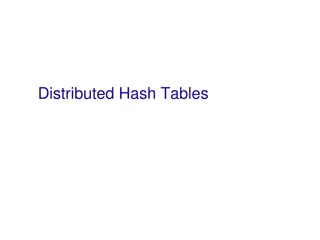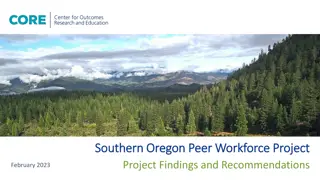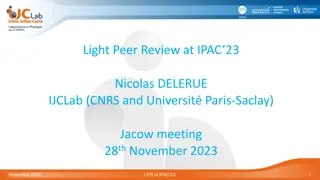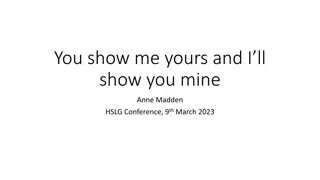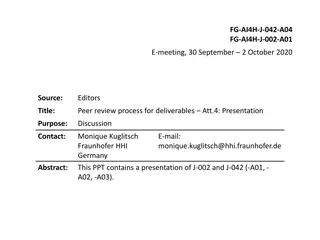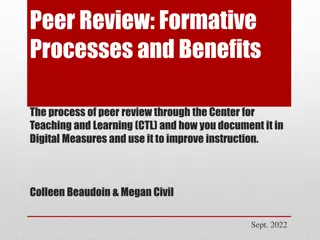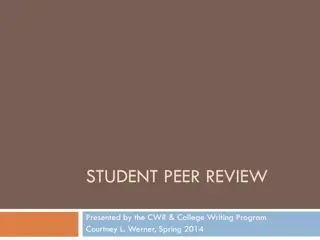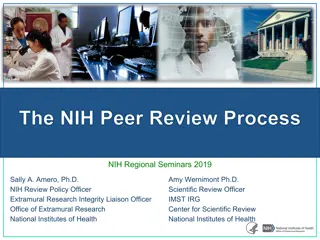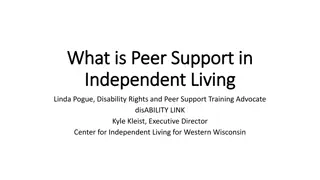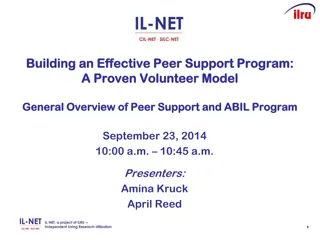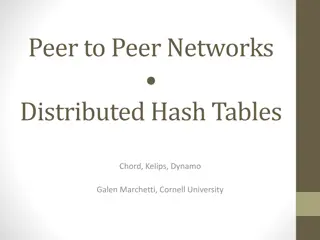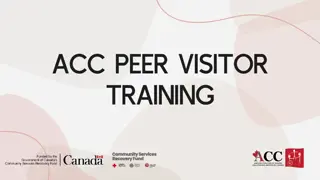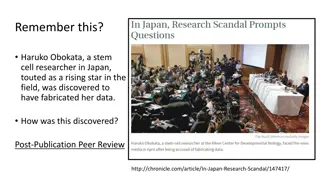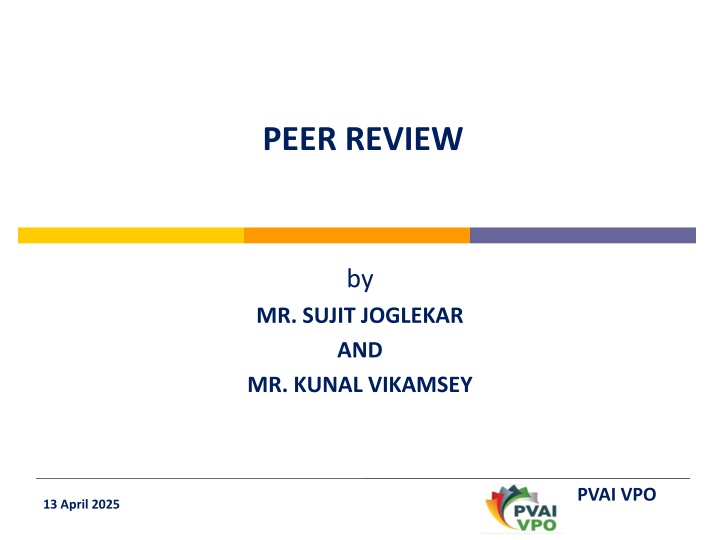
Understanding the Peer Review Process in Valuation
Learn about the peer review process in valuation, where valuers critique and evaluate each other's reports to ensure compliance with professional standards. Discover the importance of adhering to applicable standards and the role of peer review committees in upholding quality in valuation practices.
Download Presentation

Please find below an Image/Link to download the presentation.
The content on the website is provided AS IS for your information and personal use only. It may not be sold, licensed, or shared on other websites without obtaining consent from the author. If you encounter any issues during the download, it is possible that the publisher has removed the file from their server.
You are allowed to download the files provided on this website for personal or commercial use, subject to the condition that they are used lawfully. All files are the property of their respective owners.
The content on the website is provided AS IS for your information and personal use only. It may not be sold, licensed, or shared on other websites without obtaining consent from the author.
E N D
Presentation Transcript
PEER REVIEW by MR. SUJIT JOGLEKAR AND MR. KUNAL VIKAMSEY PVAI VPO 13 April 2025
Peer Review/ Valuation Review Process In a peer review, a valuer is required to review and critique another valuer s analysis and opinions. The process of reviewing another valuation report is not limited simply to identifying possible calculation errors in the analysis. It also requires the reviewer to determine if the report being reviewed was developed consistent with generally accepted valuation practices and applicable standards. 4. Similarly, reviewer should also adhere to applicable standards when conducting the review. 1. 2. 3. a. PVAI VPO 13 April 2025
Peer Review/ Valuation Review Process Defined: A process of developing and communicating an opinion about the quality of all or part of the work of another valuer. Glossary of IVS 2017, a valuation reviewer is a professional valuer engaged to review the work of another valuer. As part of a valuation review, that professional may perform certain valuation procedures and/or provide an opinion of value It is intended to provide information to the intended users about the credibility of the work under review. 1. 2. 3. 4. PVAI VPO 13 April 2025
Applicable Standards The report being reviewed and the reviewer should follow applicable professional standards for valuation review, development, and reporting. These include IVS, USPAP, Red book, Standards by ICAI or AICPA PVAI has not framed its independent valuation standards and has chosen to adopt International Valuation Standard (IVS). PVAI is the first member association to represent India at IVSC. At PVAI: All RV members (L&B/P&M) to adopt IVS, for valuation reports prepared under IBC OR Companies Act 2013. We have also given a confirmation to IBBI of us adopting IVS as our Valuation standard. 1. 2. 3. 4. 5. PVAI VPO 13 April 2025
PVAI: Peer Review for IBBI 1. PVAI formed a Peer Review Committee to perform a peer review exercise of our member RVs. 2. Five (5) Reports from registered valuer members were reviewed 3. Template: captured essential requirements of any valuation report based on; 4. Rule No 8: Conduct of Valuation of IBBI Registered Valuers Rules AND IVS Standard No 103: Valuation Reporting. 5. RVs to comment whether they have complied with all requirements. 6. RV Valuation reports were vetted by Peer Review Committee against these requirements. PVAI VPO 13 April 2025
IVS 103: Valuation Reports Std 30.1. Where the report is the result of an assignment involving the valuation of an asset or assets, the report must convey the following, at a minimum: the scope of the work performed, including the elements noted in para 20.3 of IVS 101 Scope of Work, to the extent that each is applicable to the assignment, the Approach and Methods adopted, the key inputs used, the assumptions made, the conclusion(s) of value and principal reasons for any conclusions reached, and the date of the report (which may differ from the valuation date) 1. 2. 3. 4. 5. 6. 7. PVAI VPO 13 April 2025
Para 20.3, IVS 101: Scope of Work (a) Identity of the valuer: The valuer may be an individual, group of individuals or a firm. If the valuer has any material connection or involvement with the subject asset or the other parties to the valuation assignment, or if there are any other factors that could limit the valuer s ability to provide an unbiased and objective valuation, such factors must be disclosed at the outset. If such disclosure does not take place, the valuation assignment is not in compliance with IVS. If the valuer needs to seek material assistance from others in relation to any aspect of the assignment, the nature of such assistance and the extent of reliance must be made clear. 1. PVAI VPO 13 April 2025
Para 20.3, IVS 101: Scope of Work (b) Identity of the client(s) (if any): (c) Identity of other intended users (if any): (d) Asset(s) being valued: (e) The valuation currency (f) Purpose of the valuation: (g) Basis/bases of value used (h) Valuation date (i) The nature and extent of the valuer swork and any limitations thereon 2. 3. 4. 5. 6. 7. 8. 9. 10. (j)The nature and sources of information upon relied upon: 11. (k) Significant assumptions and/or special assumptions: PVAI VPO 13 April 2025
Para 20.3, IVS 101: Scope of Work 12. (l) The type of report being prepared: 13. (m) Restrictions on use, distribution/ publication of report: 14. (n) That the valuation will be prepared in compliance with IVS and that the valuer will assess the appropriateness of all significant inputs: PVAI VPO 13 April 2025
Peer Review Observations: 1. Although all RVs claimed to have prepared their valuation report in compliance with IVS, most reports lacked an explicit declaration stating the same. 2. We also noted of deviations from IVS. The deviations generally observed when reviewing the valuation reports pertain to the following; a) Use of different valuation standards: We observed that in some tangible asset valuation reports, references were drawn to ICAI valuation standards and definitions used from that standard, which was in contravention to adoption of IVS. PVAI VPO 13 April 2025
Peer Review Observations: b) Scope of work was not elaborately captured in engagement letter NOR in transmittal letter/ Executive summary for valuation. IVS requires any a Valuer of communicate the Scope of Work to its client that would include amongst many things, the identity of Valuer, purpose, intended use and user, asset identification, valuation date etc. PVAI VPO is in the process of preparing a standardized offer letter covering the all aspects of IVS Scope of work as well as IBC rules and the same will be submitted shortly. PVAI VPO 13 April 2025
Peer Review Observations: c) Under IBC, each report needs to address two bases of Value viz. Fair Value and Liquidation Value. The definition of value i.e. bases of value and source of the definition was not stated in some reports. d) Some valuation reports still mention Fair Market Value/ Realizable Value and Liquidation Value, when these terms and bases of value are not the reporting requirements under IBC. e) A discussion on generally accepted valuation methods: It was observed that most reports still follow the tabular form of reporting wherein they miss out on addressing this aspect. The reports do not confirm having Considered all three generic approaches to value and do not cite reasons for selection of any particular method or for disregarding any approach. PVAI VPO 13 April 2025
Peer Review Observations: f) Value conclusion: A separate section where Valuer Reconciles values estimated using one or more approaches and to finally arrive at a single value opinion is absent in the report. g) Liquidation value (LV): In the absence of data relating to liquidation sales, valuers normally provide a discount to Fair Value to arrive at LV. The discounts offered are arbitrary without proper justification. It is our opinion that we need to have a white paper on LV, its sub-sets viz. Forced liquidation/ Orderly liquidation, its applicability and how it affects the various classes of assets. PVAI VPO 13 April 2025
Peer Review Observations: h) Under IBC, the entire asset side of Corporate Debtor s (CD) balance sheet is to be valued. It was noted that when reporting, most valuers do not record their FV/LV opinions against Book values of the CD. i) Assumptions and Disclosures: There is no standardization in the disclosures required to be made OR assumptions used in preparing the report. All RVOs together are working towards this and a disclaimer committee has also been formed. j) Restrictions on the use of report: A statement explicitly restricting the end use of the report to intended user and for intended purpose only was missing from valuation report. PVAI VPO 13 April 2025
Peer Review Observations: 3. Lack Mathematical accuracy was not observed to be a cause of concern. However, some reports submitted were noted to be without back-up calculations for their value conclusion. We also noted that comparable instances involving wrong asset class was used or there was incorrect choice in documenting method of valuation. 4. Description of the subject: Inadequate, since reports still follow tabular format and instead of describing the subject, one-word replies are sated against a particular column. of Comparable data/ Inadequate representation: PVAI VPO 13 April 2025
Peer Review Observations: 5. Infirmities observed in Report writing: Valuers are primarily from technical background and in our opinion specific training to hone report writing skills would be of immense help e.g. Use of grammatically correct language, Short yet cogent sentences for descriptions etc. Similarly, quality of presentation of the reports is an area that needs to be improved upon e.g. we observed use of varying fonts, text size etc Use of Company name instead of individual RV name for preparation of report. Some valuers who were mid -way though the assignment were asked to rectify the erroneous documentation. During the early periods of registration, a few instances were also observed when Valuers accepted assignments even before obtaining COP from RVO. 6. 7. PVAI VPO 13 April 2025
Peer Review Observations: 8. Date of Valuation: As on date of commencement of CIRP or date of commencement of Liquidation Process or as may be required by the Liquidator. It was observed that Major changes in Accounting Policies over the Previous Year was not highlighted. 10. In some report it was observed that Inventories are being valued based purely on management representation without physical verification/ random sampling. 9. PVAI VPO 13 April 2025
THANK YOU PVAI VPO 13 April 2025



